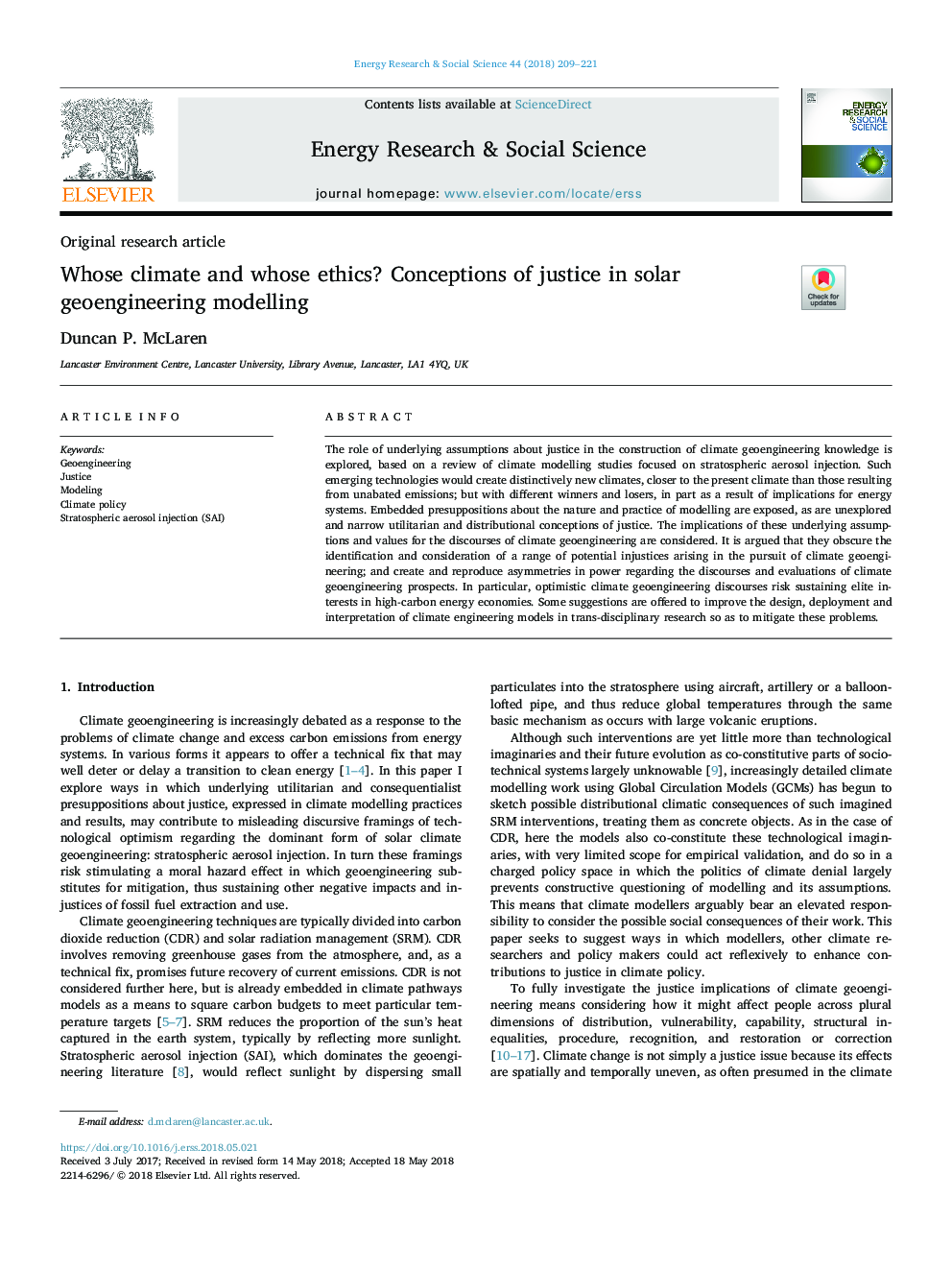| کد مقاله | کد نشریه | سال انتشار | مقاله انگلیسی | نسخه تمام متن |
|---|---|---|---|---|
| 6557213 | 1422558 | 2018 | 13 صفحه PDF | دانلود رایگان |
عنوان انگلیسی مقاله ISI
Whose climate and whose ethics? Conceptions of justice in solar geoengineering modelling
ترجمه فارسی عنوان
چه آب و هوا و چه اخلاقی؟ مفهوم عدالت در مدل سازی ژئودینامیک خورشیدی
دانلود مقاله + سفارش ترجمه
دانلود مقاله ISI انگلیسی
رایگان برای ایرانیان
کلمات کلیدی
ترجمه چکیده
بر اساس بررسی بررسی مطالعات مدلسازی آب و هوائی که بر روی تزریق آئروسل استراتوسفر صورت می گیرد، نقش پیش فرض های اساسی در مورد عدالت در ساخت دانش ژئودینامیکی اقلیمی مورد بررسی قرار گرفته است. چنین فن آوری های در حال ظهور، آب و هوای جدیدی را به طور مشخصی ایجاد می کند که به جو زمین نزدیک تر است نسبت به آب و هوای ناشی از آن؛ اما با برندگان و بازنده های مختلف، بخشی به عنوان یک نتیجه از پیامدهای سیستم های انرژی است. پیش فرض های جاسازی شده در مورد طبیعت و عمل مدل سازی در معرض، مانند کشف نشده و مفاهیم محدود و سودمند و توزیع کننده عدالت است. مفاهیم این مفروضات و ارزشهای اساسی برای گفتمانهای ژئودینامیکی آب و هوایی مورد توجه قرار گرفته است. استدلال می شود که آنها شناسایی و در نظر گرفتن طیف وسیعی از بی عدالتی بالقوه ناشی از تعقیب ژئودینامیک آب و هوایی را پنهان می کنند؛ و ایجاد عدم تقارن در قدرت در رابطه با گفتمان و ارزیابی چشم انداز جوی مهندسی آب و هوا. به طور خاص، گفتمانهای ژئودینامیکی آب و هوایی خوش بینانه منجر به حفظ منافع نخبه در اقتصادهای انرژی کربن بالا می شود. برخی از پیشنهادات برای بهبود طراحی، استقرار و تفسیر مدل های مهندسی آب و هوا در تحقیقات بین المللی ارائه شده است تا این مشکلات را کاهش دهند.
موضوعات مرتبط
مهندسی و علوم پایه
مهندسی انرژی
انرژی (عمومی)
چکیده انگلیسی
The role of underlying assumptions about justice in the construction of climate geoengineering knowledge is explored, based on a review of climate modelling studies focused on stratospheric aerosol injection. Such emerging technologies would create distinctively new climates, closer to the present climate than those resulting from unabated emissions; but with different winners and losers, in part as a result of implications for energy systems. Embedded presuppositions about the nature and practice of modelling are exposed, as are unexplored and narrow utilitarian and distributional conceptions of justice. The implications of these underlying assumptions and values for the discourses of climate geoengineering are considered. It is argued that they obscure the identification and consideration of a range of potential injustices arising in the pursuit of climate geoengineering; and create and reproduce asymmetries in power regarding the discourses and evaluations of climate geoengineering prospects. In particular, optimistic climate geoengineering discourses risk sustaining elite interests in high-carbon energy economies. Some suggestions are offered to improve the design, deployment and interpretation of climate engineering models in trans-disciplinary research so as to mitigate these problems.
ناشر
Database: Elsevier - ScienceDirect (ساینس دایرکت)
Journal: Energy Research & Social Science - Volume 44, October 2018, Pages 209-221
Journal: Energy Research & Social Science - Volume 44, October 2018, Pages 209-221
نویسندگان
Duncan P. McLaren,
